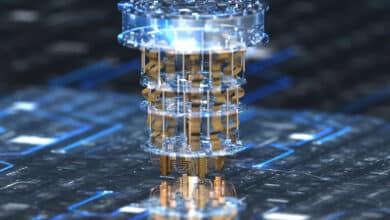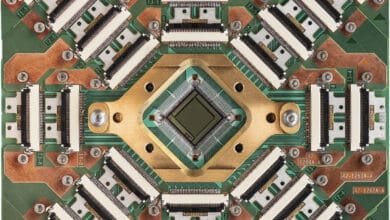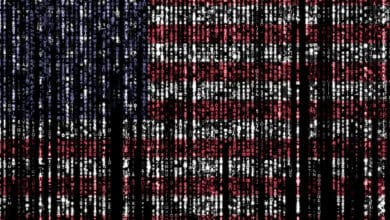Quantum Computing
PostQuantum.com – Industry news and blog on Quantum Computing, Quantum Security, PQC, Post-Quantum, Quantum Tech
-
Variational Quantum Eigensolver (VQE) Breakthroughs
The Variational Quantum Eigensolver (VQE), introduced in 2014, has rapidly become a flagship algorithm for simulating ground-state properties on today’s noisy quantum computers. Rather than running long quantum circuits, VQE uses short circuits and a classical optimizer in tandem: the quantum processor prepares a trial wavefunction with adjustable parameters, and…
Read More » -
Quantum Contrarianism
Contrarianism in quantum tech, as in any tech, is best viewed as a tool, not a truth. It’s a tool for questioning and refining the narrative, for ensuring we don’t delude ourselves. But it is not the final truth of what the technology will or will not achieve – that…
Read More » -
Quantum Technologies and Cybersecurity: Threats and Defenses
Quantum technologies introduce a new era for cybersecurity – one that is simultaneously perilous and full of potential. On the threat side, the advent of quantum computers threatens to upend the cryptographic protections we rely on daily, making it imperative that we transition to quantum-safe methods before quantum attackers emerge.…
Read More » -
Quantum Computing Benchmarks: RCS, QV, AQ, and More
As quantum computing hardware rapidly improves, simple metrics like qubit count are no longer sufficient to gauge a system’s true capability. Unlike classical computers where transistor counts roughly correlate with performance, quantum bits (qubits) can be error-prone and short-lived, so a few high-fidelity qubits can be more valuable than many…
Read More » -
Adiabatic Quantum (AQC) and Cyber (2024 Update)
Adiabatic Quantum Computing (AQC) is an alternative paradigm that uses an analog process based on the quantum adiabatic theorem. Instead of discrete gate operations, AQC involves slowly evolving a quantum system’s Hamiltonian such that it remains in its lowest-energy (ground) state, effectively “computing” the solution as the system’s final state.…
Read More » -
Quantum Technology Initiatives in Europe and EU
Europe’s quantum technology landscape has evolved from disparate academic projects into a coordinated multi-billion euro endeavor encompassing the EU and its member states. The historical commitment to quantum science is now manifesting in tangible outputs: prototype quantum computers in laboratories and supercomputing centers, quantum-secure communication testbeds linking cities, and quantum…
Read More » -
Quantum Hacking: Cybersecurity of Quantum Systems
While these machines are not yet widespread, it is never too early to consider their cybersecurity. As quantum computing moves into cloud platforms and multi-user environments, attackers will undoubtedly seek ways to exploit them.
Read More » -
The Quantum Approximate Optimization Algorithm (QAOA) – A Beginner’s Guide
At its core, QAOA is a hybrid quantum-classical algorithm that constructs a special kind of quantum circuit (or “ansatz”) to represent a candidate solution, and then uses a classical optimizer to tweak that circuit for better results. It was introduced in 2014 by Edward Farhi and collaborators as an algorithm…
Read More » -
Career Opportunities in Quantum Technologies (No PhD Required)
The landscape of careers in quantum technologies is incredibly rich and expanding by the day. What was once the domain of a few theoretical physicists is now a broad industry ecosystem hungry for talent from all backgrounds: software, hardware, analytics, management, and more. The driving premise is that you do…
Read More » -
Australia Quantum Computing & Quantum Technology
Australia’s quantum technology journey has progressed from pioneering academic experiments to a coordinated national endeavor spanning government, academia, and industry. The country has built a solid foundation with landmark research in quantum computing (particularly in silicon qubit hardware and error correction) and has extended its expertise to quantum communications and…
Read More » -
Quantum Technology Use Cases in Aerospace & Automotive
Quantum computing is on the verge of reshaping the future of both aerospace and automotive sectors, even if the technology’s full maturation is still years away. In this article, we’ve seen that current developments – from corporate partnerships and research alliances to early quantum prototypes tackling real use cases –…
Read More » -
Quantum Technology Use Cases in Finance & Banking
Quantum computing is no longer just a physics lab curiosity; it’s emerging as a strategic frontier for the Finance and Banking sector. Quantum technologies hold the potential to transform financial services – improving risk management, turbocharging trading and analytics, enhancing cybersecurity, and even forcing a paradigm shift in how data…
Read More » -
Quantum Technology Use Cases in Government & Defense
Quantum computing is on the cusp of reshaping government and defense, much as radar or the internet did in earlier eras. It promises enhancements across the board – unbreakable communications, unprecedented computing power for logistics and AI, new sensors that reveal hidden threats, and simulations that accelerate innovation. It also…
Read More » -
Quantum Computing & Quantum Technology Initiatives in the USA
The United States has entered a new phase of quantum technology development – one marked by large-scale engineering challenges and system integration, rather than just laboratory science. The next decade will be critical. If current trends hold, we will witness U.S. quantum computers tackling problems that were impossible before, quantum…
Read More » -
Quantum Computing & Quantum Technology Initiatives in Canada
Canada has established itself as a major hub of quantum technology research, and its recent initiatives aim to translate that strength into societal and economic benefits. The country’s National Quantum Strategy, with its coordinated missions in computing, communications, and sensing, provides a roadmap for the next stage of quantum innovation…
Read More »














